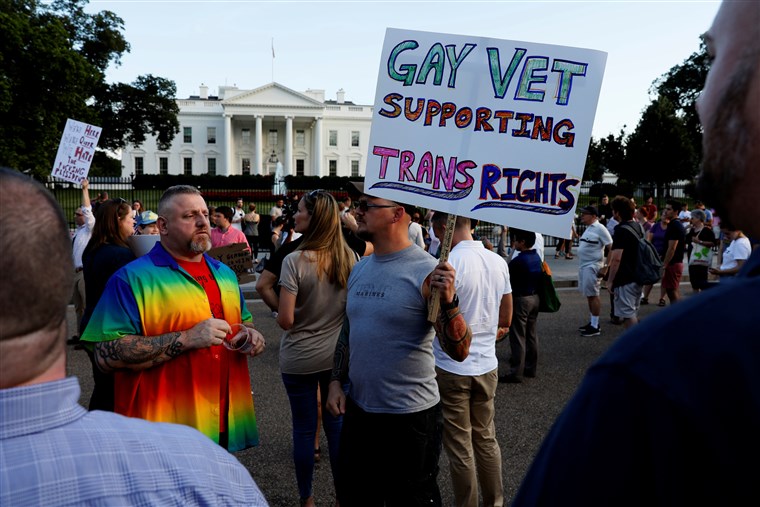Trump’s Transgender Military Ban Now in Effect
Demonstrators gather to protest President Donald Trump’s announcement that he plans to reinstate a ban on transgender individuals from serving in any capacity in the U.S. military, at the White House on July 26, 2017
April 15, 2019
President Trump’s new ban, barring most transgender people from serving in the military, took effect on Friday. Many advocacy groups went after the Trump administration for moving forward with the new policy.
Under the new policy, which was approved by the Pentagon in March, new military recruits are prohibited from transitioning and the military is allowed to discharge those currently serving if they do not present themselves under their biological sex. The Pentagon insists that the new policy does not actually ban transgender individuals from serving, arguing that service members can simply pretend that they’re not transgender.
There are approximately 15,000 transgender people serving in the military, according to the National Center for Transgender Equality. Transgender troops have been serving openly since the Obama administration lifted a previous ban in 2016 and said the Pentagon will cover medical costs for uniformed personnel who undergo gender-affirming transition.
President Donald Trump originally ordered the new ban in 2017. In July of 2017, Trump tweeted that transgender people will not be allowed “to serve in any capacity in the U.S. Military,” citing medical costs and “disruption.”
“Our military must be focused on decisive and overwhelming victory and cannot be burdened with the tremendous medical costs and disruption that transgender in the military would entail,” the president said. The American Medical Association said Thursday that the policy characterizes transgender people as having a “deficiency.” The American Medical Association also said in an April press release that there “is no medically valid reason — including a diagnosis of gender dysphoria — to exclude transgender individuals from military service.”
Several lawsuits were filed to block the ban, and multiple federal judges granted injunctions. In March of 2019, The D.C. Circuit Court of Appeals dissolved the remaining injunction — Stone v. Trump — against Trump’s ban.
Transgender troops say the regulation also emulates the “don’t ask, don’t tell” policy that prevented gay men and women from serving openly in the military. Congress repealed that policy in 2010. “The policy is insidious in operation but designed to be as comprehensive a ban as possible,” a report from the nonpartisan Palm Center, which studies LGBTQ military issues, stated. “In that sense, it is a perfect parallel to the failed ‘don’t ask, don’t tell’ policy, also sold as not being a ban although designed to systemically push gay people out of military service — or at least keep them silent and invisible.”


